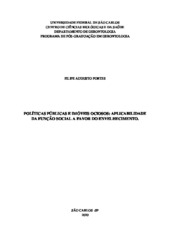| dc.contributor.author | Portes, Filipe Augusto | |
| dc.date.accessioned | 2020-06-20T01:23:46Z | |
| dc.date.available | 2020-06-20T01:23:46Z | |
| dc.date.issued | 2020-05-27 | |
| dc.identifier.citation | PORTES, Filipe Augusto. Políticas públicas e imóveis ociosos: aplicabilidade da função social a favor do envelhecimento. 2020. Dissertação (Mestrado em Gerontologia) – Universidade Federal de São Carlos, São Carlos, 2020. Disponível em: https://repositorio.ufscar.br/handle/ufscar/12941. | * |
| dc.identifier.uri | https://repositorio.ufscar.br/handle/ufscar/12941 | |
| dc.description.abstract | The demographic transition represents a complex and unprecedented phenomenon in the history of mankind, and never before has there been such a large number of elderly people in the world. Projections point out that in Brazil population aging tends to intensify in the coming decades, requiring relevant strategies on the part of public authorities and society. Concomitantly, Brazilian cities have unequal conditions, marked by socio-spatial segregation, and reveal a considerable idle real estate stock. This scenario contradicts the principles laid down by the legislation and tends to represent an even greater problem in view of the current demographic dynamics. Therefore, it is understood the importance of actions and policies that promote the right to the city, especially those most vulnerable. In this sense, this work systematizes alternatives to demands that are interrelated with the progress of population aging, based on the precept of the social function of property and based on legislative analysis of legal-urban instruments. Thus, it is understood that social inclusion, made possible through the democratization of urban space, represents a key element in the promotion of conditions relevant to old age. Thus, this research aimed to analyze the presence of idle properties in the central region of the municipality of Araraquara (SP), aiming at the applicability of the social function, requalifying them for housing and / or social facilities that serve people in the old age phase. The study has a cross-sectional, descriptive and exploratory character, based on the assumptions of the quantitative-qualitative method of investigation. This work represents an outline of a larger project, entitled “Right to the City and the Elderly: proposal for requalification of idle properties”, which was carried out with regular assistance from FAPESP (process nº 2017 / 15781-9). In other words, from the field visit phase until the verification of active debt, there was a significant minimization of the findings. In view of the data analysis and analysis, it was possible to identify 62 properties without proper use, 28 of which had been in this situation for at least five years. Of this sample, only 10% had active debt, expressing requirements for action by mechanisms such as the Instituto do Abandono. Such an outcome demonstrates that the link between abandonment and tax burdens, provided for by the legislation, weakens the principles that support the social function of property. Thus, it is possible to perceive the potential of instruments such as PEUC and Social Leasing, which lack specific regulations and applicability at the municipal level. Finally, it could be seen that socio-spatial segregation is a reality fueled by the inapplicability of existing provisions in the constitutional and infraconstitutional wording, exposing the lack of commitment of public agents, among other major factors that make up urban inequality. Thus, the presence of idle properties represents an obstacle to the realization of the right to the city, bringing with it socio-environmental damage inconceivable in the face of contemporary incitement. | eng |
| dc.description.sponsorship | Coordenação de Aperfeiçoamento de Pessoal de Nível Superior (CAPES) | por |
| dc.language.iso | por | por |
| dc.publisher | Universidade Federal de São Carlos | por |
| dc.rights | Attribution-NonCommercial-NoDerivs 3.0 Brazil | * |
| dc.rights.uri | http://creativecommons.org/licenses/by-nc-nd/3.0/br/ | * |
| dc.subject | Envelhecimento | por |
| dc.subject | Direito à cidade | por |
| dc.subject | Imóveis ociosos | por |
| dc.subject | Políticas públicas urbanas. | por |
| dc.subject | Aging | eng |
| dc.subject | Right to the city | eng |
| dc.subject | Idle properties | eng |
| dc.subject | Urban public policies | eng |
| dc.title | Políticas públicas e imóveis ociosos: aplicabilidade da função social a favor do envelhecimento | por |
| dc.title.alternative | Public policies and idle properties: applicability of the social function in favor of aging | eng |
| dc.type | Dissertação | por |
| dc.contributor.advisor1 | Monteiro, Luzia Cristina Antoniossi | |
| dc.contributor.advisor1Lattes | http://lattes.cnpq.br/2890278808923978 | por |
| dc.contributor.advisor-co1 | Gonçalves, Luciana Márcia | |
| dc.contributor.advisor-co1Lattes | http://lattes.cnpq.br/9491069760631962 | por |
| dc.description.resumo | A transição demográfica representa um fenômeno complexo e inédito na história da humanidade, sendo que nunca antes houve um número tão elevado de pessoas idosas no mundo. As projeções apontam que no Brasil o envelhecimento populacional tende a se intensificar nas próximas décadas, exigindo estratégias pertinentes por parte do poder público e da sociedade. Concomitantemente, as cidades brasileiras apresentam condições desiguais, marcadas pela segregação socioespacial, e revelam um considerável estoque imobiliário ocioso. Esse cenário contraria os princípios dispostos pela legislação e tende a representar uma problemática ainda maior diante da atual dinâmica demográfica. Portanto, compreende-se a importância de ações e políticas que impulsionem o direito à cidade, principalmente àqueles mais vulneráveis. Neste sentido, este trabalho sistematiza alternativas à demandas que se inter-relacionam com o progresso do envelhecimento populacional, fundamentando-se no preceito da função social da propriedade e embasando-se em análise legislativa de instrumentos jurídicos-urbanísticos. Assim, compreende-se que a inclusão social, viabilizada por meio da democratização do espaço urbano representa peça-chave para a promoção de condições pertinentes à velhice. Deste modo, esta pesquisa teve como objetivo analisar a presença de imóveis ociosos na região central do município de Araraquara (SP), visando a aplicabilidade da função social, requalificando-os para moradia e/ou equipamentos sociais que atendam pessoas na fase da velhice. O estudo possui caráter transversal, descritivo e exploratório, pautado nos pressupostos do método quanti-qualitativo de investigação. Este trabalho configura um recorte de um projeto maior, intitulado “Direito à Cidade e Pessoa Idosa: proposta de requalificação de imóveis ociosos”, o qual foi realizado com auxílio regular FAPESP (processo nº 2017/15781-9). Os resultados representam o afunilamento obtido por meio das etapas que consolidaram o método, as quais descartaram ou mantiveram os imóveis por meio de indícios sobre suas respectivas ociosidades. Ou seja, da fase de visita de campo até a constatação de dívida ativa, houve sensível minimização dos achados. Diante da apuração e análise dos dados foi possível identificar 62 propriedades sem uso adequado, sendo que 28 encontravam-se nesta situação há pelo menos cinco anos. Desta amostra, apenas 10% apresentou dívida ativa, manifestando requisitos para a ação de mecanismos como o Instituto do Abandono. Tal desfecho demonstra que o vínculo entre abandono e ônus fiscais, disposto pela legislação, enfraquece os princípios que sustentam a função social da propriedade. Com isso, percebe-se a potencialidade de instrumentos como o PEUC e a Locação Social, os quais carecem de regulamentação específica e aplicabilidade em âmbito municipal. Por fim, pôde-se constatar que a segregação socioespacial é uma realidade alimentada pela inaplicabilidade de dispositivos existentes na redação constitucional e infraconstitucional, expondo o descomprometimento dos agentes públicos, dentre outros fatores preponderantes que compõem a desigualdade urbana. Sendo assim, a presença de imóveis ociosos representa empecilho à efetivação do direito à cidade, trazendo consigo prejuízos socioambientais inconcebíveis diante das incitações contemporâneas. | por |
| dc.publisher.initials | UFSCar | por |
| dc.publisher.program | Programa de Pós-Graduação em Gerontologia - PPGGero | por |
| dc.subject.cnpq | CIENCIAS SOCIAIS APLICADAS::PLANEJAMENTO URBANO E REGIONAL::SERVICOS URBANOS E REGIONAIS | por |
| dc.description.sponsorshipId | CAPES: 88882.427078/2019-01 | por |
| dc.publisher.address | Câmpus São Carlos | por |
| dc.contributor.authorlattes | http://lattes.cnpq.br/9595577214579920 | por |


